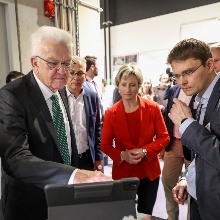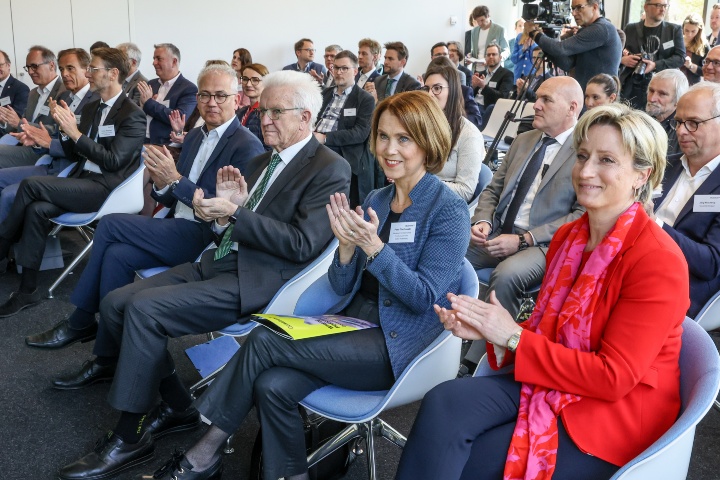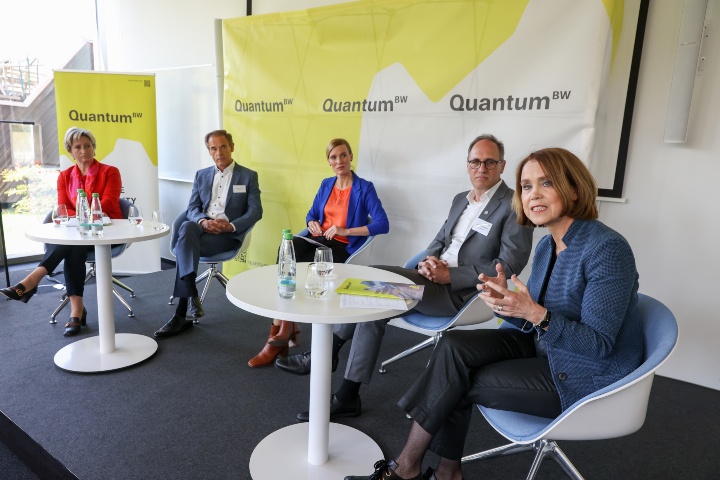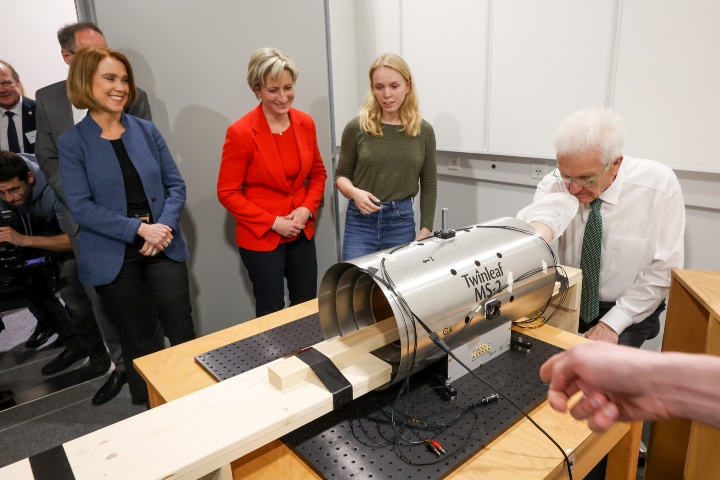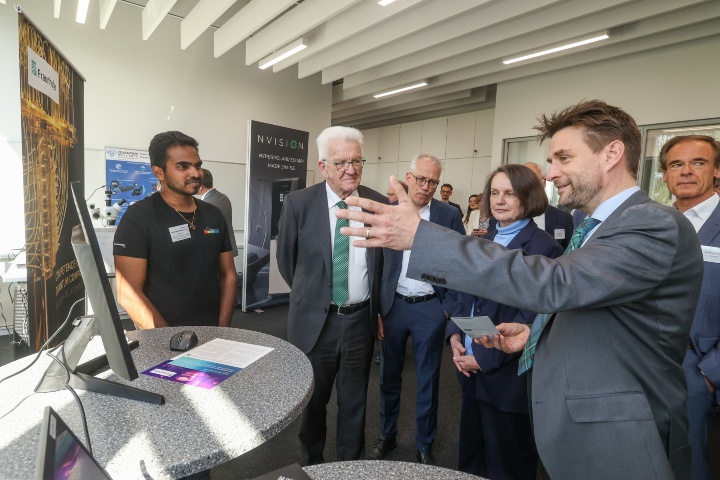At the Center for Applied Quantum Technology (ZAQuant) at the University of Stuttgart, Baden-Württemberg's Minister President Winfried Kretschmann, Minister of Science Petra Olschowski and Minister of Economics Dr. Nicole Hoffmeister-Kraut, together with partners from science and industry, launched their "Innovation Offensive in Quantum Technology" on April 21. QuantumBW gives structure to the already existing network of universities, research institutions, global players and start-ups. It bundles research activities and initiatives in the state under one roof, strengthening existing activities in quantum sensing and quantum computing.
IQST, QSens, ZAQuant and more
The fact that the University of Stuttgart is an important part of the quantum community is reflected in its research focus on quantum technology, which covers the broad spectrum from basic research to the development of technological applications with state-of-the-art infrastructure and in international, interdisciplinary, highly funded cooperation projects.
The IQST, the Center for Integrated Quantum Sciences, was founded back in 2014 and is established as one of the leading quantum centers worldwide. Here, the University of Stuttgart conducts research on the fundamentals of quantum science and transfers them into quantum technology applications together with the University of Ulm and the Max Planck Institute for Solid State Research, as well as numerous partners from industry. In the future cluster "Quantum Sensors of the Future" QSens [de] of the Federal Ministry of Education and Research, it performs lead research with partners from science and industry on the industrial use of quantum sensor technology.
At ZAQuant, the focus since 2021 has been on cutting-edge research into novel nanophotonic quantum sensors and materials, as well as precision measurements with quantum sensors. Researchers at the University of Stuttgart are also heavily involved in projects of the Competence Center Quantum Computing Baden-Württemberg, where the currently most powerful quantum computer in Europe is being built, as well as in other projects, such as the development of a Rydberg quantum computer or the CZS Center for Quantum Photonics QPhoton.
QuantumBW kickoff in the world's most modern quantum research building
Professor Wolfram Ressel, Rector of the University of Stuttgart, welcomed the guests to the QuantumBW kickoff event at the world's most modern research building for quantum technologies ZAQuant. He emphasized, "The University of Stuttgart, with its cutting-edge research in quantum technologies and its excellent infrastructure such as ZAQuant, is pleased to join QuantumBW in further advancing the state of Baden-Württemberg in the international competition for ideas, minds, markets and investments."
In his keynote speech, Minister President Kretschmann spoke of quantum technologies as the key technology of the future: "They have the potential to transform our world in ways we could not have imagined before." High-performance quantum computers, ultrasensitive sensors or particularly precise MRI devices offer enormous opportunities in the key societal areas of health, mobility and climate protection. "Baden-Württemberg has outstanding quantum expertise in science and industry: with QuantumBW, we are now setting the decisive course for Baden-Württemberg to expand this top position," Kretschmann said, calling out the goal of obtaining the first concrete products, market-ready applications and regional value creation in three to five years.
Panel discussion: Contents and goals of QuantumBW
QuantumBW is based on a successful network that is already creating added value for society in areas such as medical diagnostics and imaging, said Science Minister Olschowski in the panel discussion on the content and goals of QuantumBW. The new structure and umbrella brand will strengthen the network and make it even more visible internationally, she added. "In this way, we are also increasing the appeal for highly qualified researchers and specialists. We are starting where Baden-Württemberg is already particularly strong: In quantum sensor technology in particular, there is a high density of excellent research institutions and leading companies." This focus, combined with the strong involvement of industrial partners, sets QuantumBW apart from other networks in Germany, he said.
"It is important that we are as far ahead as possible in value creation with novel quantum sensors or the applications of quantum computing," emphasized Economics Minister Hoffmeister-Kraut. For her, it also counts that the players in QuantumBW act in concert and "let quantum innovations give rise to new industrial pillars in the state."
The QuantumBW spokesman for science, Professor Joachim Ankerhold, head of the Institute for Complex Quantum Systems at Ulm University, sees undreamed-of prospects for application not only in quantum sensor technology: "Even if quantum computing still needs significantly more fundamental development work, it has the potential to revolutionize materials research or logistics, for example." QuantumBW spokesman for economics Dr. Volkmar Denner, former chairman of the Bosch board of management, added that quantum technologies require high upfront investments and long staying power, only then entirely new applications can emerge.
Laboratory tour with muscle contraction measurement
After the panel discussion, the guests from politics, science and industry were given an insight into research in the optimally shielded precision laboratories at ZAQuant. "The damping against external vibrations in our laboratories consists of 200 tons of concrete blocks on air springs," explained Professor Jörg Wrachtrup, head of ZAQuant. "In them, we can produce atomically precise materials for quantum technologies, for example, arranging atoms as quantum bits on a surface." His team demonstrated how muscle contraction measurement works with quanta. This opens up completely new possibilities, for example, for intelligent prostheses and future human-machine interfaces in everyday life.
Wearable quantum sensors for Industry 4.0 manufacturing processes
QSens speaker Professor Jens Anders from the University of Stuttgart and his team presented the first wearable quantum sensors based on the measurement of nuclear and electron spins, which were developed in the QSens cluster at the University of Stuttgart. "One of the first target applications for this is in high-precision quality control in manufacturing processes in the context of Industry 4.0. In addition, other future applications are in materials research and personalized medicine," Anders said, immediately drawing a connection to the state's quantum strategy: "We are looking forward to QuantumBW because, as researchers with strong industrial partners, we can transfer our cutting-edge research into sustainable value chains."
Successful spin-offs from the University of Stuttgart
Not only scientists, but also companies and start-ups used the QuantumBW event for networking. They presented various application areas of quantum technology: from a quantum-based coffee machine to affordable imaging technology that shows whether cancer therapies are responding. University of Stuttgart spin-offs such as Swabian Instruments with their measuring devices for high-precision microscopy of molecules were also on hand to show that the transfer of research results into applications is successful.
January 2025
November 2024
September 2024
August 2024
July 2024
June 2024
May 2024
April 2024
March 2024
September 2023
August 2023
July 2023
April 2023
February 2023
August 2022
July 2022
January 2022
December 2021
July 2021
April 2021
Prof. Dr. Stefanie Barz in conversation with Dorothee Bär, German Minister of State for Digitization
March 2021
February 2021
January 2021
December 2020
October 2020
June 2020
May 2020
March 2020
February 2020
January 2020
December 2019
November 2019
October 2019
September 2019
August 2019
July 2019
February 2019
November 2018
October 2018
September 2018
August 2018
June 2018
April 2018
February 2018
January 2018
December 2017
November 2017
April 2017
January 2021
Media contact
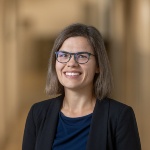
Lydia Lehmann
Deputy Head of University Communications


